Martial Law, Election Conspiracies, and the 2024 Transfer of Power: Could the Biden Administration Face a Constitutional Crisis?
An analysis of conspiracy theories that emerged since the November 5 election results, historical uses of martial law, and what happens if the presidential transition is delayed.
Listen to the audio version here:
I'm not a politician, just a proud American who has always defended women's rights, women's voices, and the pursuit of equal opportunities for all. As a proud voter for Hillary Clinton in 2016 and Kamala Harris in 2024, I believe in supporting leaders who stand for inclusivity and the advancement of women in every arena. Since I'm not a seasoned politician—nor was my major political science in college—my analysis is based on my own research. While I believe my information is accurate, please double-check any points where you deem appropriate. I am passionate about amplifying diverse perspectives and empowering women to have a seat at every table, whether in the workplace, the community, or the highest levels of leadership. My advocacy stems from a commitment to fairness and a belief that our country thrives when every voice is heard and valued. Though my opinions may not align with every political agenda, I speak from the heart on issues that matter deeply to me as an individual dedicated to justice, equality, and the future of our nation.
The Case for a Historic Harris Presidency: Shattering the Glass Ceiling, Even Briefly
Many Americans believe that a brief presidency for Vice President Kamala Harris, should President Biden step down or the 25th Amendment be invoked, would mark an important step forward for representation and equality in American politics. Twice, the presidential candidacies of both Hillary Clinton and Kamala Harris faced significant challenges from a voter base primarily composed of POORER AND LESS EDUCATED VOTERS who overwhelmingly supported Donald Trump. This trend has sparked conversations about barriers to female leadership in U.S. politics, as these voting blocs seem to lean against female candidates. If Kamala Harris were to become the 47th President of the United States, even for just a few months, it could help reshape outdated thinking by breaking the longstanding notion that "America isn't ready for a woman president."
Seeing a woman hold the office, even briefly, would set a historic precedent that could inspire future generations and demonstrate the readiness of a female leader to handle the country’s top job. It could also signal a shift in public attitudes, showing that the presidency is no longer an exclusively male domain. Additionally, having a female president, even temporarily, would highlight the importance of diverse perspectives in leadership roles. By embracing this change, the United States could take a bold step toward greater inclusivity and a broader acceptance of women in leadership, paving the way for future female candidates to be seriously considered and supported on their merits. For these reasons, many believe that a Harris presidency, however short, could be both transformative and essential to breaking down the gendered barriers that persist in American politics.
Did Starlink Influence the 2024 Election Results?
The 2024 U.S. presidential election concluded with Donald Trump as the president-elect, yet a wave of conspiracy theories has emerged alleging interference in Trump’s victory. CLAIMS SUGGEST THAT BILLIONAIRE ELON MUSK MAY HAVE USED HIS STARLINK SATELLITE NETWORK TO MANIPULATE ELECTION RESULTS IN TRUMP’S FAVOR. Widely circulated on social media, these theories propose that Starlink was connected to voting processes in all critical swing states—Arizona, Michigan, Nevada, Wisconsin, North Carolina, Georgia, and Pennsylvania.
What’s striking is that Trump won every single one of these key states, an outcome that is particularly unusual given that Democrats simultaneously secured Senate seats in each. The disparity between the presidential and Senate results has fueled speculation, with many seeking explanations for what appears to be an improbability.
Adding to the controversy, a reporter alleged that in California—a non-swing state—a Starlink satellite internet connection was linked to a voting machine. This claim has only amplified questions about Starlink’s possible involvement in election processes. With these allegations gaining traction, some have begun to question whether the Biden administration might consider invoking martial law to investigate the election’s integrity and potentially delay the transition of power.
Could this also explain why California has shown a surprising shift toward Republican support in this election, a notable contrast to previous years, given California’s long-standing reputation as a solid blue state? This unusual trend has added fuel to the speculation surrounding Starlink’s alleged involvement, raising more questions about potential shifts in voter behavior and election security.
The Allegations Against Musk, Starlink, and the 2024 Election
The conspiracy theory, primarily shared through platforms like TikTok and X (formerly Twitter), suggests that Musk’s satellite network Starlink interfered with voting machines. A viral TikTok video by the account @etheria77, with over 1.6 million views, claims that Starlink allowed California and other states to manipulate vote counts. Prominent accounts on X, such as @AesPolitics1, amplified the video, pushing for an investigation. The theory gained further traction when podcaster Joe Rogan allegedly suggested Musk knew Trump would win before official results were called.
Historical Precedents: Martial Law in the United States
Martial law has been invoked sparingly in U.S. history, primarily during periods of war or extreme civil unrest, but it is something to consider if national security or democratic stability is at risk. For example:
The Civil War (1861-1865): President Abraham Lincoln used martial law to curb Confederate sympathizers, suspending habeas corpus and detaining those suspected of aiding the Confederacy. This was seen as necessary to preserve the Union in an existential crisis.
World War II and Hawaii (1941-1944): Following the attack on Pearl Harbor, President Franklin D. Roosevelt placed Hawaii under martial law, transferring civilian authority to the military to secure the territory against possible invasion.
The Little Rock Crisis (1957): President Dwight Eisenhower deployed federal troops to enforce desegregation orders at Little Rock Central High School, asserting federal authority in the face of state resistance to protect civil rights.
In each instance where martial law or military intervention has been used in U.S. history, it was deployed as a necessary measure to protect national security or uphold federal mandates when local authorities faced significant challenges. Each case was carefully managed and focused on restoring stability, demonstrating the executive branch’s ability to use martial law responsibly and effectively. Given the importance of election integrity and democratic stability, some argue that invoking martial law could be warranted if compelling evidence of interference emerges, as it would safeguard the nation’s democratic processes at a critical time.
For example, some voting data from this election cycle doesn’t seem to add up, raising questions about transparency. In Arizona—one of the seven critical swing states that ultimately went to Trump—87% of votes have been counted, showing the following totals:
Kari Lake (R) : 1,425,546
Ruben Gallego (D) : 1,470,600
Kamala Harris: 1,389,309
This data presents a peculiar scenario: Kari Lake has more votes than Kamala Harris, the presidential candidate, yet she trails her opponent, Ruben Gallego. How could it be that Lake garnered more votes than a presidential candidate yet didn’t secure her own race? Such discrepancies have fueled calls for clarity and transparency, with many questioning if these unexplained patterns in vote counts warrant deeper investigation.
Can the Biden Administration Use Martial Law to Protect the Integrity of American Votes?
Under the U.S. Constitution, the president’s term is firmly set to end at noon on January 20 following an election year, regardless of circumstances. Even if martial law were declared to address concerns about election integrity, it would NOT allow President Biden to extend his term beyond this date. The 20th Amendment enforces this limit, underscoring that Biden’s first term ends on January 20, 2025, and martial law does not alter this constitutional rule.
Declaring martial law could temporarily help maintain public order, especially if election-related protests or unrest were to arise. However, it would only serve as a short-term measure, likely ending once order is restored or the courts have addressed the validity of the election. Importantly, martial law does not provide a mechanism for President Biden to bypass the scheduled transition or continue beyond his first term’s end.
The fact that Biden is completing his first term rather than a second does not change the constitutional limits that apply.
Could Kamala Harris Become Acting President?
Since both Biden and Vice President Kamala Harris are completing their first terms, neither would automatically continue in office after noon on January 20 if no president-elect is certified by then. If there is still no confirmed winner at that point, the Presidential Succession Act would apply. Under this act, the Speaker of the House becomes the acting president until the election dispute is resolved—not Biden or Harris. This provision ensures a temporary solution to maintain continuity of government, even if the transition process is delayed by ongoing legal challenges or investigations into election integrity.
The current Speaker of the House is Rep. Mike Johnson, a conservative hard-liner and ally of former President Donald Trump, who was recently elected to the position. Should the succession process reach this point, Johnson would assume the role of acting president temporarily, adding a unique dimension to the transition of power given his political alignment and support for Trump. This scenario underscores the importance of clear election outcomes to avoid prolonged uncertainty in presidential succession.
Invoking the 25th Amendment: Ensuring Continuity of Leadership
There are talks about invoking the 25th Amendment, particularly in light of recent concerns about election integrity. However, the 25th Amendment, specifically Section 4, provides a constitutional mechanism primarily for removing a sitting president if they are deemed unable to perform their duties due to physical or mental incapacity—not to address election disputes. This section allows the vice president, with the support of a majority of the Cabinet, to declare the president unfit, temporarily transferring power to the vice president as acting president. Here’s how the process unfolds:
Declaration of Incapacity: The vice president and a majority of the Cabinet send a written declaration to Congress stating that the president cannot fulfill their duties.
Transfer of Power: Upon Congress’s receipt of this declaration, the vice president immediately becomes acting president.
President’s Response: If the president contests this action, they can submit a written statement asserting that they are fit to resume their duties.
Congress’s Decision: In the event of a dispute, Congress has 21 days to vote. A two-thirds majority in both the House and Senate is required to keep the vice president as acting president.
The 25th Amendment was designed to address scenarios where a president is unable to perform their duties due to physical or mental incapacity, not as a mechanism to extend a term of office or override election results. In theory, if there were concerns about election fraud, President Joe Biden and Vice President Kamala Harris could not invoke the 25th Amendment as a way to remain in power. The amendment’s purpose is to temporarily transfer power if the president is incapacitated, not to sidestep electoral processes or address disputes over election outcomes. If election fraud allegations arose, they would need to be addressed through the courts, recounts, or congressional procedures, rather than through the 25th Amendment.
Could It Be Possible There Is No Certified President by January 20?
If allegations surrounding Starlink and election interference prevent the confirmation of Trump as the president-elect, the United States would face a unique constitutional challenge. The Electoral College officially certifies the president-elect, with Congress counting these votes on January 6. If a certification stalemate occurs and no candidate is declared the winner by January 20, the Presidential Succession Act dictates the next steps.
In such a scenario, Speaker of the House Mike Johnson, a Republican, would assume the role of acting president until a clear winner is confirmed. This temporary measure would ensure continuity of government while preventing an unconstitutional extension of Biden’s presidency or an unconfirmed inauguration of Trump.
What Happens if a President-Elect is Imprisoned Before Taking Office?
Now, there are a number of cases against Donald J. Trump, so what would happen if Trump were to be imprisoned prior to being sworn in? There has never been a case in U.S. history where a president-elect was imprisoned before being sworn into office. However, if such a scenario were to occur, it would lead to a unique constitutional and legal situation, resulting in significant legal challenges and legislative action, as it would set an unprecedented situation in the transition of power. Here’s how it might unfold:
Eligibility and Swearing-In: The U.S. Constitution does not explicitly prevent a president-elect from assuming office if they are under indictment, convicted, or even imprisoned. As long as the president-elect meets the basic qualifications (age, citizenship, residency) and is certified as the winner by the Electoral College, they could still be sworn in on Inauguration Day, EVEN FROM PRISON.
Transfer of Power: If the president-elect were imprisoned, they could potentially use executive powers upon taking office, including the power to pardon themselves (though this is legally untested and controversial) or appoint a successor to act on their behalf.
Invoking the 25th Amendment: Once sworn in, if the president is unable to fulfill their duties due to incarceration, the 25th Amendment could be invoked. This amendment allows the vice president, alongside a majority of the Cabinet, to declare the president unfit, making the vice president the acting president until the president can resume their duties.
Presidential Succession Act: If the president-elect were unable to take office entirely due to legal or physical incapacitation, Congress might also look to the Presidential Succession Act, placing the vice president-elect, or, if necessary, the Speaker of the House, in the role of acting president.
Final Thoughts: The Boundaries of Martial Law and the Future of Electoral Integrity
As theories circulate about Starlink’s potential involvement in the 2024 election, the Biden administration faces calls to investigate. However, the Constitution’s term limits and the role of Congress in certifying the president-elect ensure that martial law CANNOT be used to extend Biden’s presidency or prevent the transition of power. Historical uses of martial law were limited to clear national threats, making it unlikely as a tool to address election disputes. In a situation where no candidate is certified by January 20, the line of succession places the Speaker of the House as acting president until Congress finalizes the results. As investigations continue, it remains crucial for the public to rely on verified information to uphold the integrity of the electoral process and avoid further polarization in an already divided nation.
While there is no doubt that news coverage—and even X’s (formerly Twitter) own AI, Grok—has alleged that Elon Musk spread misinformation to billions, it’s important to revisit similar cases in the past where technological influence on elections led to regulatory, but not criminal, outcomes.
For instance, no one was criminally prosecuted directly for the Cambridge Analytica scandal involving Facebook in 2016.
Instead, the scandal led to substantial civil and regulatory actions. In 2019, the Federal Trade Commission (FTC) fined Facebook a historic $5 billion for privacy violations, though no criminal charges were brought against key figures involved, including Facebook executives, Cambridge Analytica's CEO, or Aleksandr Kogan, the academic who facilitated the data collection.
This precedent raises questions about accountability in our digital age, where influence over information can have profound impacts on democracy yet often results in fines or regulatory changes rather than criminal prosecution. Perhaps this points toward a future where tech moguls increasingly wield influence over elections and public opinion, striding through the corridors of power with the financial backing to shape public perception. In this age of information chaos, we may be entering a new era where wealth and technology redefine the boundaries of power—a reality that leaves many questioning whether, indeed, MONEY CAN BUY ANYTHING, EVEN ULTIMATE INFLUENCE OVER DEMOCRATIC PROCESSES.
Sharing a clip from my Twitter Space with teammate Jenn Strout on Friday, November 8. We spoke with a Trump voter and military man, LetFreedomRing, who shared his thoughts—conversations like this are happening all over America. Grateful for the freedom of the First Amendment that allows us to have these discussions.
Full Conversation on YouTube:
WHAT IS Bill S.4573?
117th Congress (2021-2022)
The Electoral Count Reform and Presidential Transition Improvement Act of 2022 (Bill S.4573) is a legislative proposal aimed at updating and clarifying the procedures for counting electoral votes in presidential elections and ensuring a smoother presidential transition. Introduced in the 117th Congress, this bill seeks to address ambiguities in the current electoral process and improve the transparency and integrity of presidential transitions.
The bill is accessible for review and detailed information at Congress.gov, provided by the Library of Congress.




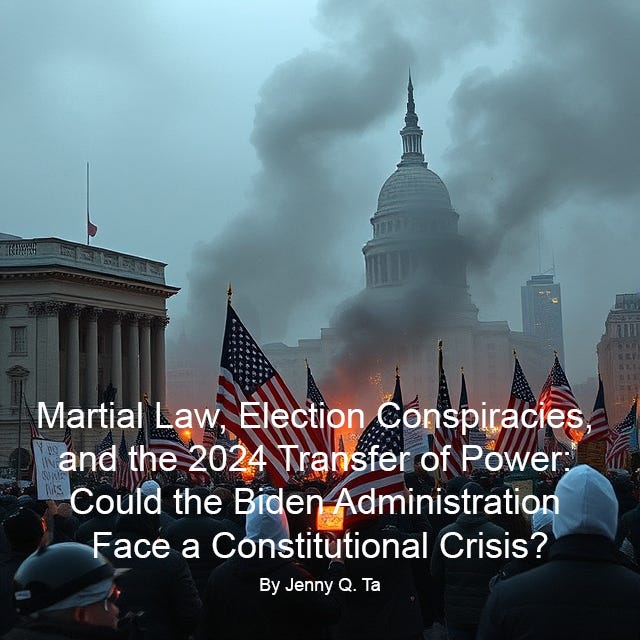





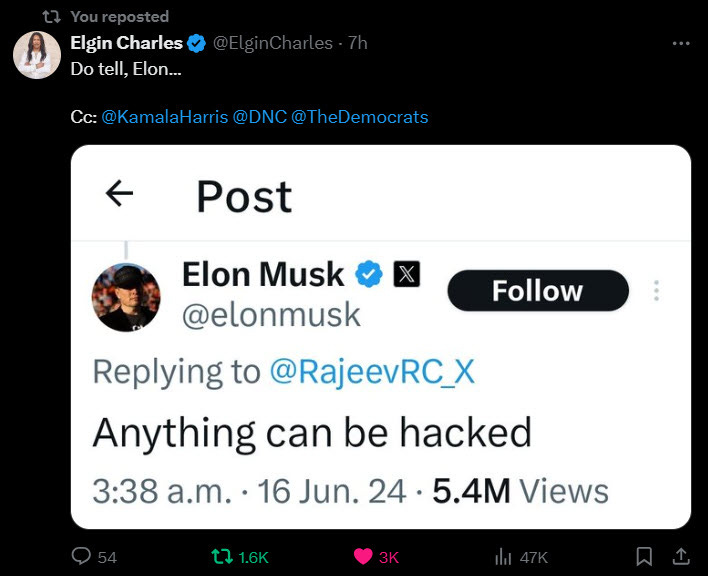
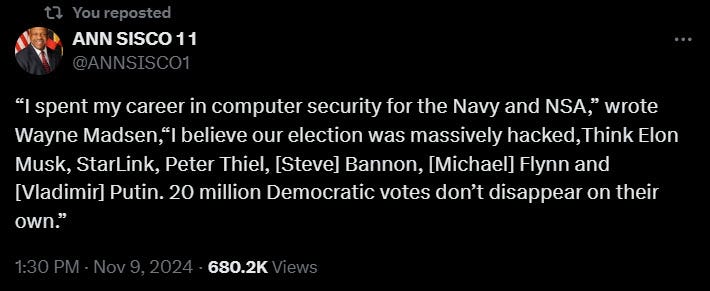
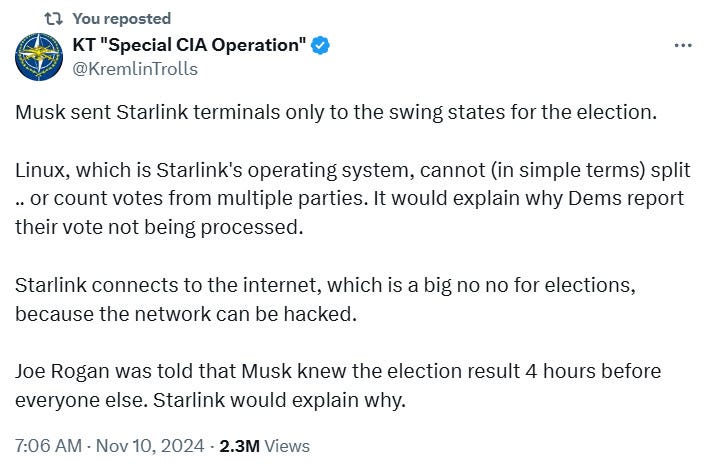
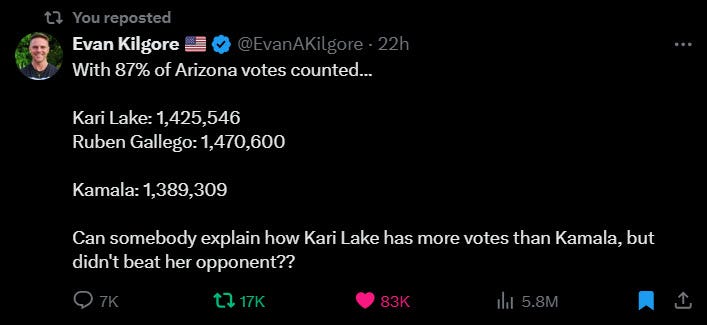

Elites are playing America for fools
There's a wave of people wanting Justice Sonia Sotomayor should be replaced by Kamala Harris